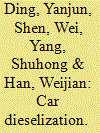| Srl | Item |
| 1 |
ID:
166546


|
|
|
|
|
| Summary/Abstract |
Road transport accounts for 92 per cent of CO2 emissions from all transport services, and car transport makes the largest contribution to the total. We examine the dynamic relationship between car CO2 emissions in western European Union countries (EU-13) with the dieselization of the passenger vehicle fleet, technological progress, fuel efficiency, mobility indicator, economic activity and motorization rate. We take advantage of a panel data set of 13 EU countries between 1990 and 2015 and estimate a Dynamic Panel Data (DPD) model using alternative econometric methods. This approach allows us to estimate the effect on car CO2 emissions of induced indirect channels involving the reaction of economic agents to changes in aforementioned explanatory variables. We provide evidence that CO2 emissions have been benefited from global technological progress and changes in average fuel efficiency, while increases of economic activity, motorization rate and the dieselization process hold positive and significant relationship with car CO2 emissions. These results are consistent with alternative model specifications and econometric methods.
|
|
|
|
|
|
|
|
|
|
|
|
|
|
|
|
| 2 |
ID:
125745


|
|
|
|
|
| Publication |
2013.
|
| Summary/Abstract |
Recently, there is a renewed interest in car dieselization in China to address the challenge of oil security. We developed an econometric model to estimate the vehicle fuels and crude oil demands. The results indicate that if the average travel distance of cars is maintained at the level of 2010-16,000 km/yr, and if the distillation products mix of the refineries remains unchanged, China's crude oil demand in 2020 will reach 1060 million tonnes (Mt), which also results in an excess supply of 107 Mt of diesel. A new balance of diesel supply and demand can be reached and crude oil demand can be significantly reduced to 840 Mt by improving the production ratio between diesel and gasoline on the supply side and promoting passenger vehicle dieselization on the demand side. The crude oil demand will be reduced to 810 Mt in 2020, if the vehicle travel distance gradually drops to 12,000 km/yr. If so, dieselization will provide a rather limited added value-only 6% further oil saving by 2020. Dieselization is not a silver bullet but it depends on a series of key factors: growth rate of gross domestic products (GDP), vehicle sales, and vehicle annual travel distance.
|
|
|
|
|
|
|
|
|
|
|
|
|
|
|
|
| 3 |
ID:
118820


|
|
|
|
|
| Publication |
2013.
|
| Summary/Abstract |
In Sweden the market share of diesel cars grew from below 10 per cent in 2005 to 62 per cent in 2011 despite a closing gap between pump prices on diesel oil and gasoline, and diesel cars being less favored than ethanol and biogas cars in terms of tax cuts and other subsidies offered to "environment cars". The most important factor behind the dieselization was probably the market entrance of a number of low-consuming models. Towards the end of the period a growing number of diesel models were able to meet the 120 g CO2 threshold applicable to "environment cars" that cannot use ethanol or biogas. This helped such models increase their share of the diesel car market from zero to 41 per cent. Dieselization appears to have had only a minor effect on annual distances driven. The higher average annual mileage of diesel cars is probably to a large extent a result of a self-selection bias. However, the Swedish diesel car fleet is young, and the direct rebound effect stemming from a lower variable driving cost may show up more clearly as the fleet gets older based on the assumption that second owners are more fuel price sensitive than first owners.
|
|
|
|
|
|
|
|
|
|
|
|
|
|
|
|